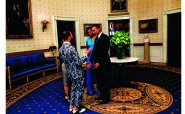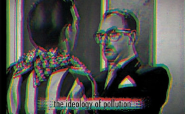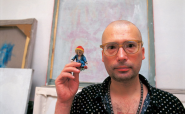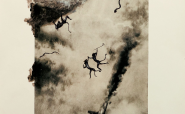| Umělec magazine 1999/4 >> Czech Artists Are Not Self-Initiated (Interview with artist and curator Andrée Cooke) | List of all editions. | ||||||||||||
|
|||||||||||||
Czech Artists Are Not Self-Initiated (Interview with artist and curator Andrée Cooke)Umělec magazine 1999/401.04.1999 Vladan Šír | q & a | en cs |
|||||||||||||
|
Andrée Cooke (1966) graduated from Central Saint Martins School of Art and Design in London. Since 1992, when she was awarded scholarship at the Prague Academy of Fine Arts, she has been living in Prague. She curated the Window Gallery, Prague’s British Council exhibition space. During the past two years she has been living in Prague and London.
You’ve been living in Prague for quite a while and have been in close contact with the art scene here. What are your impressions of it, how is it different from the Western art world? I find that quite a difficult question. I’m not interested in looking at artists in a nationalistic way. Nationalist themes are often dictated or chosen by curators. In general what concerns me is the way curators here often try to themetize shows according to a specific idea at that moment - for example putting on a political show, trashy or whatever, but often using the same artists to fit it to each or all of the categories. Also these theme choices are often picked up through art magazines rather than first hand experience. This does not show what artists in the Czech Republic are particularly interested in. They are themes chosen or influenced by people in different places looking at different artist’s work. Following this theme does not give a clear picture of what’s going on in Prague or Olomouc or the interest of Czech artists. If you live somewhere like America, you’ve got thousands and thousands of artists working there and somebody who’s looking for a theme finds anything they want in some artist’s work. It seems that over the period of several years the same artists are constantly being asked to vary their style, or their interests or the content of their work according to the theme of the moment. It’s not a correct perspective. There’s probably a hundred strong artists working here (by artists I mean people who have already graduated from the Academy), practicing artists. It is a stylistic quality of, for example, some of Jiří David’s generation of artists to produce a fragmented body of work, this is the way he or others work, but it may be quite dangerous for the younger artists to feel like trashy work’s in, so they do trashy work, or political work’s in so let’s make political work. I think this lack of self-generated interest is really problematic here. Does this concern the work of Jana and Jiří Ševčík? I respect their work. The Ševčíks have tried to do something here. They are predominantly curators and art historians and as a curator or an art historian, their job is to work with themes. They’ve done the best that they can under the circumstances. They don’t have enough experience from living abroad, they’ve never been to London, they’ve been to New York a few times, but they have not been able to travel a lot outside Europe and the former Eastern Bloc. They’ve got a good European context, they go to Germany a lot, Poland, they’ve traveled around. They see things and they understand that these things are important. I’m not blaming them personally. They would not be able to understand it without living abroad for longer time. They’re not stupid people and they are trying to be as active as possible here. I think the problem more is that the artists do not take responsibility for understanding. I mean every artist wants exposure but there is a limit in self-dignity that perhaps people could try to think a little bit more cleverly about the exhibition they choose to be in here, the theme and the content of the work they choose to produce. What did you think of the latest exhibition they curated at Špálova, Perplex? My first impression when I walked in was that I liked the energy of the show. It felt like something was happening, more so than a year ago. Some of the things in the show I quite liked, some of the work has potential. [On the other hand] I thought the idea of the show was showing trendy, trashy work but with the same group of Czech artists. I think it’s a bit dangerous to contrive people into certain situations. But there are also other curators like Olga Malá and Karel Srp. What Olga Malá is doing, for example, is totally unacceptable for me. I think her permanent exhibitions are good representations of what is going on with the Czech scene, but the shows where she arbitrarily shows Czechs with foreigners without any understanding of the context of the foreigners’ work, is very poor, and makes the Czech works present in the shows seem very out of place. Also from a working level she has forged awkward relationships with some UK organizations through a small minded, disrespectful attitude. I also do not personally think her judgement of many young artists is that strong. But on the other hand I think the artists are bloody stupid to have agreed to do it. It works both ways. The artists here are not self-initiated. The younger artists are always waiting for somebody to come along and go: “We’re doing a show in the National Gallery or in Špálova or wherever.“ But they don’t really get off their asses very often and just do some wild contemporary young show. That’s what the students should be doing. In Britain you have all these artists initiated projects. It seems like people there are self-initiated. Yes, but it’s different. In the 80‘s, galleries had loads of money and they paid people. There was massive market place, people bought lots of work and there was a kind of old boys’ network who had a great time. And then the whole economy crashed and overnight the art scene couldn’t afford to promote these people anymore. So somebody like Damien Hirst, who I think is phenomenally clever, comes along. Of course the young student artists think: “I wanna be famous, I don’t want to wait too long, I can’t stand this system.“ He gets a warehouse, steals a mailing list and invites all these people. And they don’t have money and they know that they can buy these works for bargain basement prices. Effectively, the irony is that although it seems that these people are doing sort of alternative thing, they are becoming the old boys. The YBAs are now classic. They’re making tons of money. They’re now the nouveau riche who’ve made in arts. That’s fine, good luck to them. And everybody is sick of the YBAs in Britain. Because there’s lots of work being made and people are tired of that work, they start to look for work that is not so highly manufactured. It’s just not comparable and I don’t understand why people would want to compare themselves to that scene. Why don’t they compare themselves to their previous history. Then you can see what’s moved on here. In your view, the main problem of the art scene here is the lack of experience from abroad? It’s the lack of actual exposure being abroad, the lack of first-hand knowledge, having more exposure with people from abroad, trying to go abroad more or trying to develop a better sense of the background, the history or the emotions of the artists working here. This culture is very outward looking, it’s constantly looking to the west or somebody else to help about what it should do, how it should fit in. This is not a particularly healthy position to be in, it’s not very self-reflective really. What I mean precisely is: the artist who have worked for a long time, people like Petr Nikl, Václav Stratil or Antonín Střížek, this kind of generation of people or people slightly younger. My impression is that people got a bit bored with their work, they’re constantly looking for something new, they think that every half a year, every year, there should be some new theme, some new flavor instead of actually supporting what they’ve got which are some really strong artists and try to develop market for them, trying to make really strong relations with them. I think what’s missing here is that there is not enough infrastructure to help people who are already very clearly established artists with a strong body of work. Those people have really rough time. At the moment to me, that is the strongest generation, the most clearly defined, visual impact of Czech art. Underneath that you’ve got a lot of people who are in the semi-state between east and west. But I think that the people who have already made a strong voice need some help. Maybe the galleries should be focused on that more. Maybe the financial support of institutions is to blame. Why is it so difficult for somebody to get a scholarship to go abroad for a work experience or three-month residency not somewhere where they’d be told to go but somewhere where they might choose to go? Someone might choose to go to Cuba for a year, that’s fine too. I think it would be much more profitable in the long run doing that than worrying about people coming out of the Academy being treated like artists. They’re not, they’re students, or in my view anyway, they’re students. There was this myth at the art academy here that you will come out an artists, you’ll always be an artist, when you’re there you’re an artist. Great, lovely, you’ve got your degree. But what happens afterwards when you don’t have friends around you making work necessarily, you’ve got to earn a living. Then making work is your choice which is outside the activity of most working people. That’s really hard and that’s a life decision. Going to art college is not a life decision, it’s education. I don’t know if the people at the academy are not told that half of them will not continue to work. I think more support should be given to older artists, not so much to young students. But if young people have the opportunity to exhibit in Mánes or Špálova quite early in their carrier, why shouldn’t they take that chance. If you look at the last ten years, you have had a couple of generations who have come out of the Academy, who have had lots of exposure and what are they doing - their work is quite weak, some of them have given up. England is probably the opposite extreme to this but I think there is some value in making it hard for young people to have opportunity to exhibit in gallery spaces, certainly while they’re students. Once they’re out of college and they’re trying to be artists in everyday environment and they are not supported, then there is definitely value in showing these people in those spaces. There just needs to be some kind of hierarchy. There have been discussions here lately about the fact that Czech art is in crisis, it is stuck, not going anywhere. Do you think that this crisis has anything to do with the market conditions? I don’t know if it is only the market conditions. I think it partly has to do with expectations in the sense that in the time when I was in college here, which was in 1992, people who were students at the college were being asked to exhibit hell of a lot, people like the Pondělí group. And I think Pondělí is quite a good example for what I’m talking about because those people were working extremely hard, they had a lot of international shows, mostly under the guise of Eastern European art shows. Now they feel disillusioned, they didn’t sell very much work, the interest in them wasn’t maintained for a long time. It’s really disillusioning for somebody to work for about five, ten year span without very much interest and support. It may be of more financial value for the state or for people like Soros to be spending their money on supporting at least the basics for exchange and communication with abroad to help establish artists’ careers. I think it’s extremely difficult for someone from the Czech Republic to go abroad for a work experience, for study abroad. If they do have to do it, the way they do it is quite cut-throat. The people I know who’ve gone to Goldsmiths or Chelsea, it’s been really hard for them and I wonder what impact they will bring back to the Czech scene. Somebody like Pospiszyl, what experience does he bring back. I think these are important experiences. My relationship to Prague and Czech artists is very important to me on many different levels and my time at AVU was one of the best times and most influential of my life. Part of the problem is that this is a small community. It’s a powerful community that has some money behind it from the Ministry of Culture and Soros. I think it could do a great deal, it’s got very talented people here, it’s a fantastic situation, fantastic location. I think it must be really frustrating for everybody that ten years have gone by and that I think people are disappointed. The art scene here last year was an absolute stagnant disaster. It looks like it’s better, a bit more optimistic. I hope it will be really good here one day but at the moment it definitely a bit stuck. From your point of view then, everything appears to quite upside down. There’s no form of hierarchy that has been agreed between artistic establishments. Everybody is desperately trying to do the latest flavor of the month and very few people start at the basics, the background. If this country would not be so eager to be part of the West, it would be fine, there would be no criticism. But because it is trying to do that, it does it at the moment with much conflict and frustration. Everybody’s fed up, everybody’s frustrated, what’s the solution? It’s very hard to be a good artist in the sense to make really amazing work. There are very few people in the world who achieved that. In order to make work that is strong, it has to come from you, it has to come from what that person is about, the things that are important to them in their lives, and obviously important is the view of the outside world. This doesn’t mean just the Czech outside world, it means themes of wherever they’re looking at, to kind of know what’s going on and to make the effort to go and experience that. It may be a good idea to review the type of possibilities, longer-term possibilities to go abroad. The artists have to make clear decisions about the kind of work they’re interested in personally, and if they want to be part of a more international scene, then they need to move a bit, they need to know what’s going on and meet people from these places, and try to exchange ideas and possibilities with them.
01.04.1999
Recommended articles
|
|||||||||||||





Comments
There are currently no comments.Add new comment